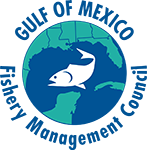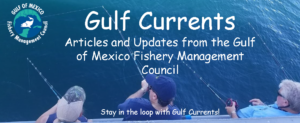 The Gulf Council is comprised of fishermen and other experts in the fishery from across the Gulf of Mexico. Drawing upon the expertise of these
The Gulf Council is comprised of fishermen and other experts in the fishery from across the Gulf of Mexico. Drawing upon the expertise of these 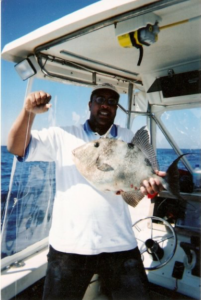 local fishermen ensures that federal fishing regulations are made with direct understanding of, and passion for, our fishery. The Council is honored to have Dr. Anthony Overton as one of its newest members.
local fishermen ensures that federal fishing regulations are made with direct understanding of, and passion for, our fishery. The Council is honored to have Dr. Anthony Overton as one of its newest members.
Dr. Anthony Overton credits his lifelong love of fishing to his dad and his childhood best friend. While growing up in Washington D.C., Anthony, his best friend, and their fathers regularly took off on fishing trips after school in the Chesapeake Bay- returning way past bedtime with coolers full of fish.
As a kid, he had no idea there was a way to make a career out of his love for fishing. His “a-ha moment” came while he was in college at South Carolina State University. At the time, he was planning to follow in his parents’ footsteps and become a teacher. A friend persuaded him to go to a seminar at a hatchery. He jokes that he probably would have skipped it had they not incentivized attendance by serving free lunch. During the seminar, he listened to a speaker from the U.S. Fish and Wildlife Service and realized for the first time, that his career, not just his free time, could be focused on fisheries.
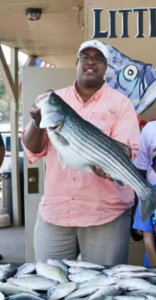 From that moment on, Dr. Overton devoted all his efforts towards the pursuit of an education in fisheries. He volunteered at the hatchery and eventually earned his Master’s degree from the University of Georgia where he studied striped bass. He then moved on to earn his Doctorate in Marine and Estuarine Environmental Science from The University of Maryland.
From that moment on, Dr. Overton devoted all his efforts towards the pursuit of an education in fisheries. He volunteered at the hatchery and eventually earned his Master’s degree from the University of Georgia where he studied striped bass. He then moved on to earn his Doctorate in Marine and Estuarine Environmental Science from The University of Maryland.
After graduation, Anthony worked as a professor at the East Carolina University before moving to his current position as the Chair of the Department of Biological and Environmental Sciences and the Director of the Graduate Program in Environmental Management at Samford 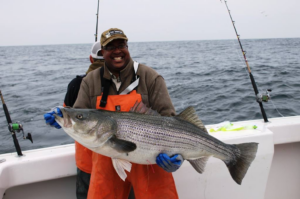 University in Homewood, Alabama.
University in Homewood, Alabama.
Dr. Overton is no stranger to fisheries management. He has served as a member of multiple Technical Working Groups with the Atlantic States Marine Fisheries Commission and served on advisory panels of the International Committee for the Conservation of Atlantic Tunas. In his personal time, he can often be found bass fishing with one of his three sons. He notes that this is the furthest he has ever lived from the coast but he still manages to wet a line regularly and treks to the Gulf to fish a few times each year.
Dr. Overton answered the following questions to provide some insight on his perspective of the Gulf fishery:
Can you share a favorite fishing memory?
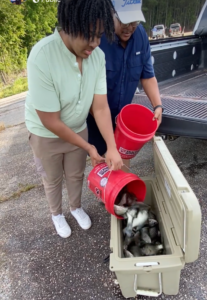 “My ‘best trip’ is hard to define. I’ve had trips where I’ve caught the big fish or the most fish, but these days I’m mostly interested in trips that are centered around spending quality time outdoors with the people I love. Last week, I had a really great trip. My middle son and I went on a guided trip out of a local lake in Alabama. We left the dock at 5:00 AM and were back at the dock by 8:15 AM with over 100 crappies. It was a perfect morning where all the stars aligned, and the fishing action was fast and furious.”
“My ‘best trip’ is hard to define. I’ve had trips where I’ve caught the big fish or the most fish, but these days I’m mostly interested in trips that are centered around spending quality time outdoors with the people I love. Last week, I had a really great trip. My middle son and I went on a guided trip out of a local lake in Alabama. We left the dock at 5:00 AM and were back at the dock by 8:15 AM with over 100 crappies. It was a perfect morning where all the stars aligned, and the fishing action was fast and furious.”
What do you hope the Council accomplishes while you have a seat at the table?
Fisheries management takes a long time and it frustrates fisherman that regulation changes happen so slowly. I would really love to create efficiencies in the science and management processes so we can be more nimble and more responsive to fishermen’s needs and to what is happening on the water. I also want to focus on encouraging new participation in the management process. I don’t want the management of our fisheries to be an echo chamber where we continue to try to solve problems with the same approaches and ideas. I hope to make space for new, innovative ideas by welcoming new people into the management process.
